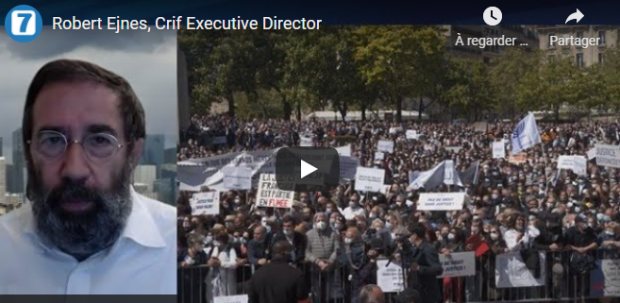 English
English Français
Français
Lu dans la presse
|
Publié le 29 Avril 2021
France - Sarah Halimi protests and antisemitism in France - interview with Crif Exec. Dir.

Published on April 27, 2021 in Arutz Sheva
The protests across France on Sunday demanding that Sarah Halimi’s killer stand trial were important because they were the expression of the incomprehension of not just Jews but of French people from all parts of society, said Robert Ejnes, Executive Director of Crif, the umbrella organization representing the interests of French Jews.
In an exclusive interview with Arutz Sheva, Ejnes said that the protests were a result of not simply the Jewish community’s fight against anti-Semitism and the fact that a Jewish woman’s killer did not have to stand trial for murder, but of France as a whole not understanding how “this can happen in a country that wants to be called the country of the ‘Rights of Man.’”
Many people were at the protests, not only the Jewish community. The demonstrations were also the “expression of many non-Jews, including Muslims and (famous) personalities” as well as artists and non-religious people.
“As French people they are totally against the decision that was rendered that does not correspond to the view that we have of the French nation.”
Ejnes does not believe that the decision by France’s highest court was born out of anti-Semitism but simply a “very restrictive interpretation of the law.” He mentioned that there is a fight going on internally between the executive and judicial powers in the country.
He noted the fact that immediately after the high court’s decision, French President Emmanuel Macron stated that if the ruling was a question of the law, then the law should be changed. Furthermore, during the demonstrations, Minister of Justice Eric Dupon-Moretti conveyed a message that he is in the process of changing the law.
Unfortunately, while anti-Semitism has always been present in French society, since 200, there has been a steep rise in Jew hatred in France. Besides Halimi, 11 other Jews have been murdered in anti-Semitic attacks during in the 21st Century, including 85-year old Holocaust survivor Mirielle Kroll who was murdered in her apartment in 2018.
He noted that today anti-Semitism is often expressed as anti-Zionism, which fits into the International Holocaust Remembrance Alliance (IHRA) working definition of anti-Semitism. “It’s a permanent fight.”
In many areas of France, it is no longer safe for Jews to walk the streets wearing a kippah or other identifying religious symbols.
“It all depends where in France. But in some areas, (it is not safe),” he said. “We need to continue (to recognize) that anti-Semitism also comes from part of the Muslim community, the radicalized Islamist community, which is definitely against Israel and against Jews.”
He added, “The killing of Sarah Halimi was really a case of an Islamic killing.”
The demonstrations, according to Ejnes, showed that French Jews have many allies in the fight against anti-Semitism and hatred. He explained that Chief Rabbi of France, Rabbi Haim Korsia, stood on stage with leaders of all religious communities, including Islamic, Catholic, Protestant and Buddhist leaders, who were showing their support for the Jewish community during this tragic time.
“They all said a psalm and really had a rare show of unity in the fight against hate and anti-Semitism,” he said.
Source :
Arutz Sheva




